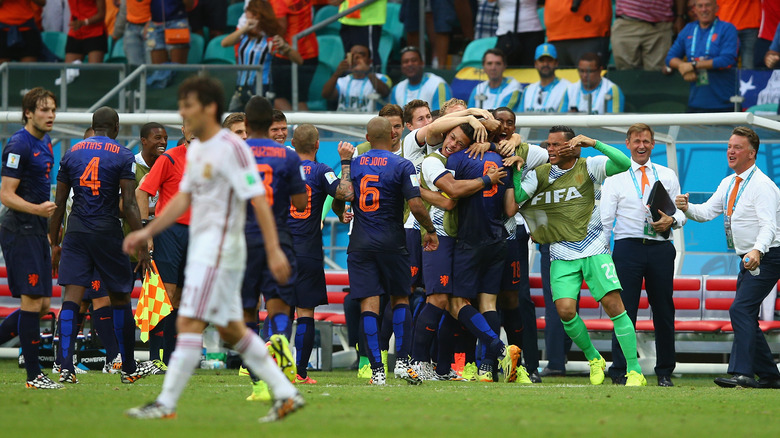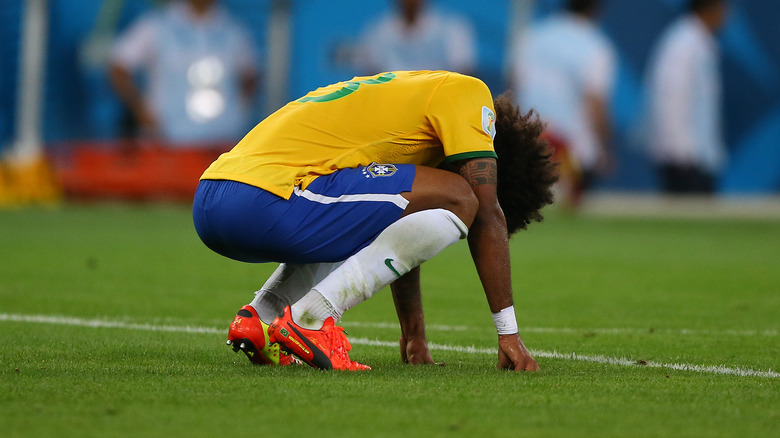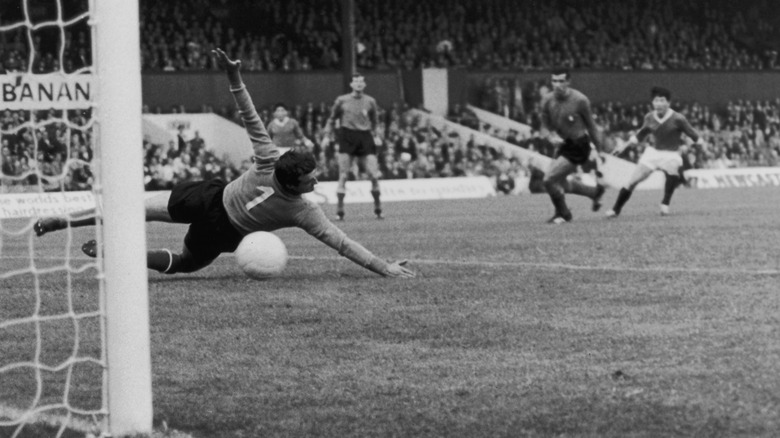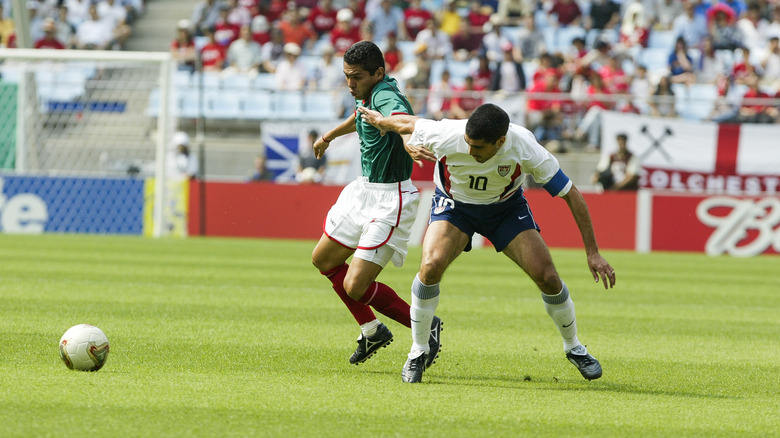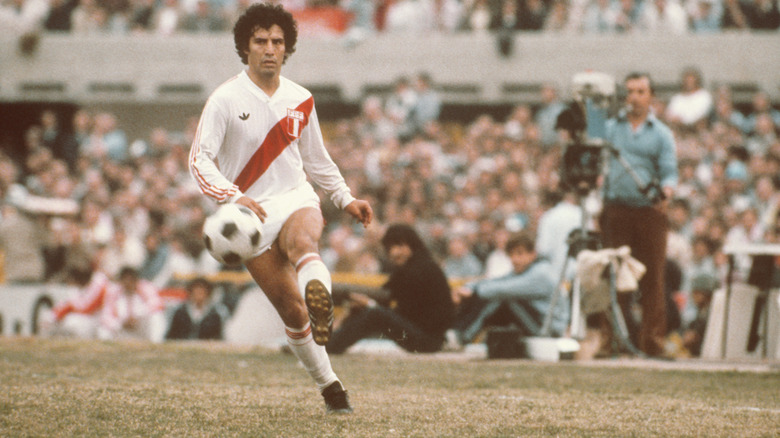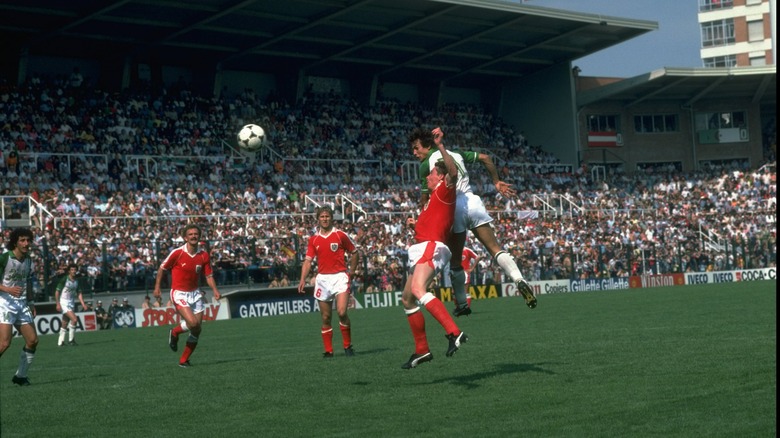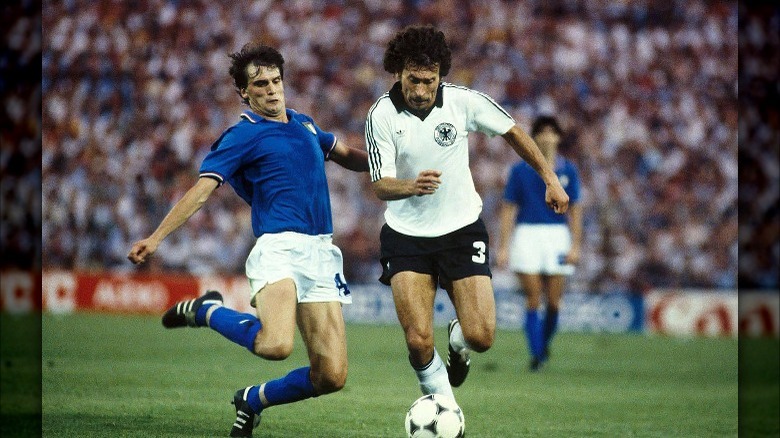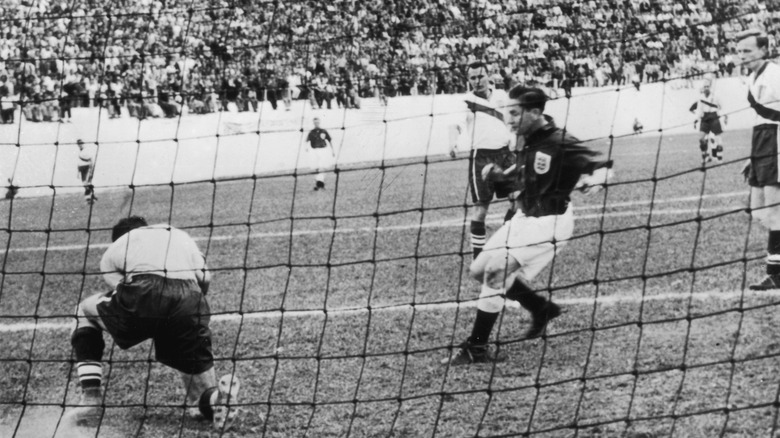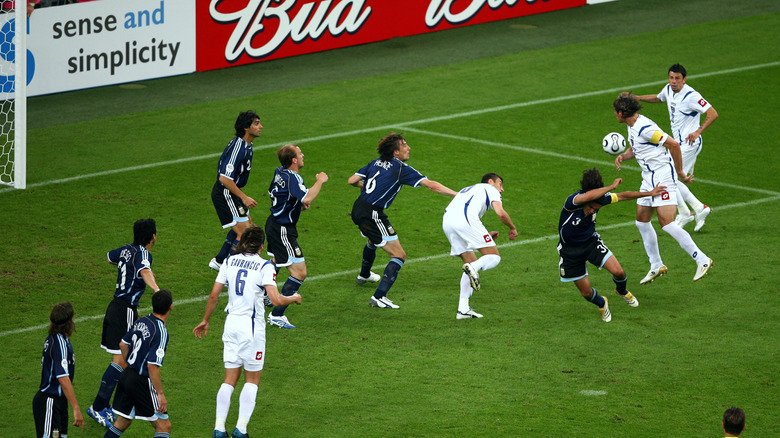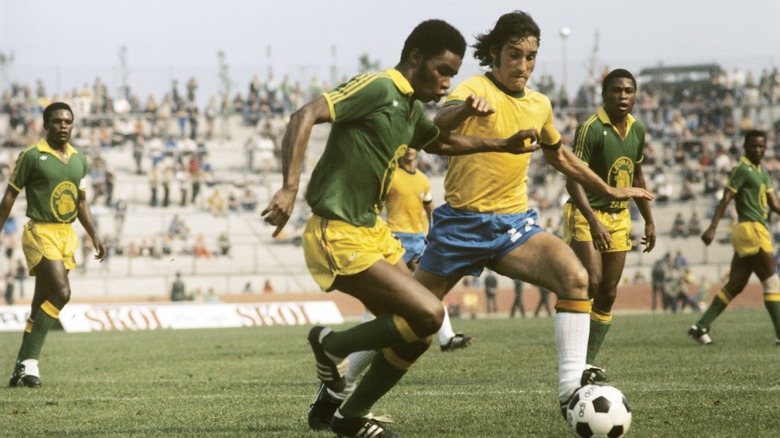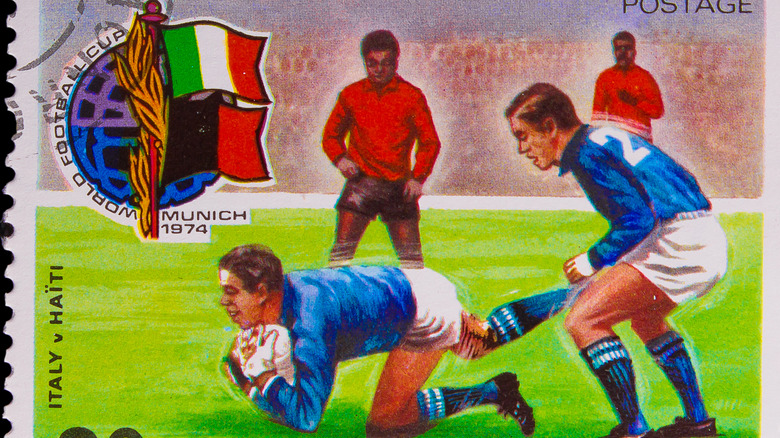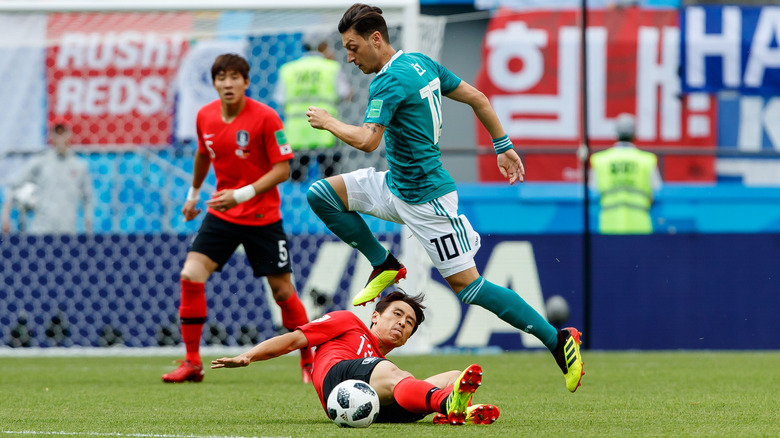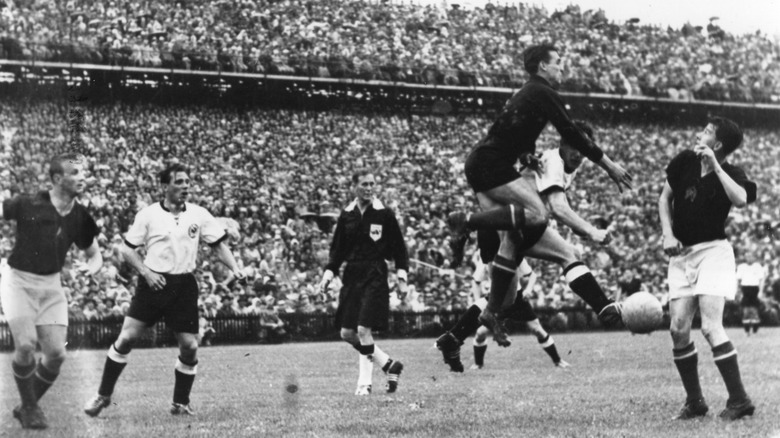The FIFA World Cup's Most Embarrassing Losses
The FIFA World Cup brings together the best of international soccer that each continent has to offer, and there are always some interesting matchups that can seem one-sided — at least on paper. But games are not won on paper but on the pitch, and the World Cup has been full of shocks. Most often, these surprises come in the form of underdogs defeating or drawing heavyweights such as Italy, Brazil, Germany, or Argentina — despite all odds being against them.
Often, these matches are considered major embarrassments for a losing heavyweight, but they are usually forgotten in the grand scheme of (soccer) things. However, there are also the humiliating routs — defeats by three, four, or even six goals — that are not simply forgotten because they're written into the record books. For a fancied national team, such defeats become days of infamy. Here are some of the FIFA World Cup's most embarrassing losses and the consequences that followed.
2014: Brazil 1-7 Germany
Starting off the list is probably the most humiliating World Cup defeat ever. Brazil hosted the tournament in 2014, and as hosts, their hard-to-please fans were expecting the Selecao to win the tournament. Brazil scraped through to the semi-final after defeating Colombia in the quarter-finals. But their fans soon found themselves wishing they had never made it that far.
Brazil faced European powerhouse Germany in the semi-final. Brazil had not been playing great throughout the tournament, but few would have expected what happened next. During the game, Brazil conceded seven goals over the course of the match and were 5-0 down by the half-hour mark, a humiliation for any team. For four-time World Cup winners Brazil, it was an unmitigated national disaster, the country's worst defeat in more than a century, per ESPN, and the first time ever Brazil had been four goals behind at the tournament. It was also Brazil's first home competitive defeat since 1975.
According to the Bleacher Report's analysis, Brazil had completely failed to control Germany's midfield and keep the ball. The Selecao were barely able to get the ball past the halfway line and put together any meaningful threats to the German net. The Brazilian public — particularly the media — were not pleased, giving many of their own players a 0/10 rating. For coach Luiz Felipe Scolari, the shame was so great that per Brazil's R7, the 74-year old coach has not retired in a bid to erase the black mark of the 7-1 defeat on his record.
1966: DPRK 1-0 Italy
North Korea is not known as a soccer powerhouse. It qualified for South Africa 2010, where they lost all their games including a 7-0 drubbing at the hands of Portugal. Before that, the team had only qualified for England 1966. But in that tournament, things turned out very differently.
North Korea was drawn into group 4 (via FIFA) with European powerhouses Italy and the USSR and 1962 World Cup hosts Chile — a tough group by any measure. The Korean team started their tournament with a 3-0 loss against the USSR. Next they drew 1-1 against Chile, giving them a lifeline to the second round. The only problem? They had to defeat two-time champions Italy.
Italy, despite encouraging pre-World Cup results, were not playing their best at the tournament. Per These Football Times, they lost 1-0 to the USSR and defeated Chile 2-0, although they were clearly not playing at 100%. Nevertheless, they were expected to breeze past the North Koreans, who had qualified in great part due to tournament boycotts in Africa and Asia.
The first half stood at 0-0 until North Korean Pak Doo-ik beat Enrico Albertosi to put the Koreans up 1-0. Incredibly, they held on against withering Italian pressure throughout the second half. Their efforts in vain, the Azzurri went home while Korea celebrated passage to the quarter-finals where they faced Portugal. The Asians' dream run ended there, squandering a 3-0 lead to lose 5-3 thanks to Portugal's playmaker Eusebio. Meanwhile, Italy's players were met with a hail of rotten tomatoes from their angry fans, according to the BBC.
2002: USA 2-0 Mexico
This game may be surprising given the scoreline was not particularly humiliating. But it was both a triumph and a tragedy because it pitted two fierce continental rivals against each other for the first and only time at a FIFA World Cup. The United States and Mexico were both surprises at Korea/Japan 2002. The Stars and Stripes were expected to go home early. As US Soccer notes, the Americans barely scraped out of the group stage with a 3-2 win against European powerhouse Portugal. Mexico, meanwhile, won its group with wins against Ecuador and Croatia and a draw against three-time champions Italy.
Due to the U.S.-Mexico rivalry in virtually everything, this game was top billing. Per U.S. midfielder Pablo Mastroeni (via MLS Soccer), presidents George Bush and Vicente Fox had even taken out a bet on the game. In the end, the United States — the underdog — triumphed 2-0 against a fancied Mexican side. Per Marca, this became known in Mexico as Mexican soccer's "blackest day" and per MLS Soccer, the "legend of dos a cero" (two-zero).
The victory, which allowed the U.S. to advance to a quarter-final against Germany, raised soccer's status inside the U.S., especially once the team appeared on the front page of The New York Times. For Mexico, it was a sign that its hegemony over the CONCACAF (The Confederation of North, Central America and Caribbean Association Football) region was at an end. While the two sides have beaten each other plenty of times since then, the U.S. has bragging rights for being undefeated against Mexico in soccer's most important tournament.
1978: Argentina 6-0 Peru
According to Argentine outlet Telam, Argentina — the 1978 World Cup hosts — were staring elimination in the face. Despite a 2-0 victory over Poland, Argentina had drawn 0-0 with Brazil. Brazil's 3-1 victory over Poland placed the Selecao in pole position to advance to the final. The only way Argentina could go forward was by beating Peru by four goals. Per ESPN, Argentina's Mario Kempes netted the first goal on the way to a 6-0 drubbing of Peru. This game was no doubt a humiliation for Peru, but there was a little more to the story.
The international media — particularly Brazil — noted that the game had gone a little too well for Argentina. Spanish media called the game "unreal," suggesting that the game had been fixed. Peru's coach believed that his players had given their all except for one — defender Rodolfo Manzo, who was widely blamed for allowing two of Argentina's goals.
The game was shady, to say the least. Argentine military dictator Jorge Videla and U.S. Secretary of State Henry Kissinger had visited Peru's locker room right before the match with the Peruvian government's blessing. According to Peru's RPP, six Peruvian players threw the match, including Manzo and goalkeeper Ramon Quiroga. The Peruvian players that had not been in on the fix had begged their coach not to play Quiroga. But he did anyway. Peru's president received an Argentine Order of the Liberator General San Martin for his participation. Argentina eventually defeated the Netherlands in the final, but their victory always carries the uncertainty of that shady humiliation of Peru.
1982: Algeria 2-1 West Germany
The 1982 World Cup in Spain saw a handful of African teams debut in the competition, which FIFA expanded from 16 teams to 24 (per FIFA History of the World Cup). And according to FIFA, Algeria took advantage by qualifying for the first time and was drawn into Group Two with Chile, Austria, and two-time winners and reigning European champions West Germany.
Algeria faced a confident West Germany. Coach Jupp Derwall (West Germany) claimed that he would throw himself into the Mediterranean if his side lost. Midfielder Paul Breitner bragged the Germans would dedicate their seventh goal to their wives and the eighth to their dogs (via These Football Times).
Algeria, however, was no pushover. The 1980 African Cup of Nations runners-up were continental heavyweights — albeit unknown in Europe. With the score at 1-1, Algeria's Lakhdar Belloumi shocked the Germans to put Algeria 2-1 ahead. The Fennecs held on to win the match. Derwall did not throw himself into the Mediterranean.
According to the Bleacher Report, Austria and Algeria were poised to go to the next round, while Germany was going home. Germany had to defeat Austria in the final group game dubbed the "Disgrace of Gijon" (or the Anschluss). Austria allowed Germany to score one goal. The two sides then kicked around the ball aimlessly until the clock ran down, sending both European sides through to the second round at Algeria's expense. Algeria filed a protest with FIFA that was rejected. However, final group matches would (from then on) be played simultaneously to avoid a repeat. Germany reached the final, where karma caught up to them.
1982: Italy 3-1 West Germany
Despite a talented squad, West Germany had a rough road to the 1982 final. After the initial defeat to Algeria, the Germans had a rough game against France. As the Bleacher Report notes, German goalkeeper Harald Schumacher knocked French forward Patrick Battiston unconscious and should have been sent off. He wasn't and Germany scraped through on penalties after a thrilling 3-3 draw.
The Azzurri had started the tournament badly. They had drawn all three of their group games and per the table, only went through because they had scored one more goal than Cameroon. But in the subsequent rounds, Italy came to life. A nail-biting 3-2 victory eliminated favorites Brazil in the quarter-finals courtesy of a hat-trick (three goals in one game) from Italy's #20 Paolo Rossi. A 2-0 win over Poland gave Italy the possibility of a third World Cup title.
The game ended in a rout. As Sports Illustrated reported back 1982, Italy stormed into the lead with a Rossi header. Marco Tardelli slammed in another goal from a cross shot at 69 minutes, becoming a legend after he celebrated by sprinting across the pitch howling with joy. The game officially became a rout when Alessandro Altobelli notched Italy's third. Paul Breitner gave the scoreline some respectability with a late consolation goal, but it did not mask the fact that the Germans — Europe's reigning champions — had been thoroughly outplayed in a final they probably should never have reached.
1950: USA 1-0 England
As noted by ESPN, the World Cup returned after a 12-year interruption due to World War II. Europe, destroyed by war, was in no condition to host the event, so Brazil hosted a reduced tournament instead. According to FIFA, European powerhouse England was among the tournament favorites, boasting a squad of seasoned professionals. The United States, which had not been seen in the World Cup since 1934, in contrast, was an amateur squad, including students, dishwashers, teachers, and drivers. The two teams were drawn into the same group. England was expected to run roughshod over the Americans. Instead, they got the shock of shocks.
The first half was goalless until 37 minutes in — a cross from American teacher and winger Walter Bahr found its way into the English penalty area with no one to finish it. As the English goalkeeper went to collect the ball, Joe Gaetjens, a Haitian student, somehow headed the ball into the net to score the lone goal of the match. The Americans held on for a 1-0 win.
The result was so unfathomable that the English press reported a 10-1 English victory. Only later was the humiliating 1-0 result confirmed. Gaetjens returned a hero to his native Haiti where he lived until 1964. Unfortunately, per the BBC, his time there coincided with the dictatorship of Francois "Papa Doc" Duvalier. After his brothers were involved in a plot to overthrow the president, the notorious Tonton Macoutes secret police disappeared Gaetjens who was never heard from again.
2006: Serbia & Montenegro's World Cup campaign
Serbia & Montenegro qualified for the 2006 World Cup in Germany with a 1-0 victory over political rivals Bosnia and Herzegovina in Belgrade. According to The Guardian, they only conceded one goal during the qualifying campaign. It was the team's last tournament as a unified country following Montenegro's independence referendum (via CNN). Nevertheless, the unified team in Germany had the full support of the Serbian and Montenegrin FAs and governments, despite tensions between the Serbian players and pro-independence Montenegrin goalkeeper Dragoslav Jevrić.
On the eve of the tournament, the Serbia & Montenegro staff claimed that the team was in high spirits and ready to play. They started respectably, losing 1-0 to the Netherlands despite playing a solid offensive game (via BBC). But the team fell to a 6-0 humiliation against Argentina.
Now, as The Guardian notes, Serbia & Montenegro had conceded two goals in 12 games (including against the Netherlands). Against Argentina, however, the Balkan side found itself 3-0 down by 65 minutes. After Mateja Kezman's red card, Argentina scored three more for a complete humiliation. According to the Irish Independent, Serbia was stunned. The FA threatened players with large fines if they did not step up their game in their final match against the already-eliminated Ivory Coast. Serbia was 2-1 up at halftime (per ESPN). But, the Ivorians fought back to win the match 3-2, rounding out Serbia & Montenegro's first, last, and only World Cup campaign that had initially promised so much.
1974: Yugoslavia 9-0 Zaire
Sub-Saharan Africa is well-represented at international tournaments and Europe's elite clubs. According to Sky History, Zaire was a trailblazer for Africa as the first sub-Saharan qualifier for the 1974 World Cup tournament in Germany (above in green vs. Brazil). President Mobutu Sese Seko rewarded the squad with a travel fund meant to cover team expenses and pay while in Germany. The well-provisioned team put in a good performance, but lost to Scotland 2-0. It was hardly a blowout and suggested that Zaire could salvage its campaign in the following match.
Alas, things went completely off the rails. Zairean officials and members of the large, government-connected team entourage had drained the travel fund of money meant to pay the players. So they mutinied and refused to play in the do-or-die fixture against Yugoslavia. Furthermore, Sese Seko, per Africa is a Country, refused to allow Zaire's Yugoslav coach Blagojev Vidinic to direct the game, accusing him of working with his Yugoslav compatriots to deny Zaire a victory. Instead, the government-appointed entourage directed the game, which was an unmitigated disaster.
Zaire went 4-0 down against Yugoslavia by 21 minutes. The Yugoslavs would score five more times, and it was clear that the Africans' heart was not in the game. However, the financial scandal behind the scenes was kept secret, and thus, the game looked to be a humiliation not just for Zaire, but for all of sub-Saharan Africa, which appeared sloppy and unprofessional.
Poland 7-0 Haiti
1974 saw another debut, the island nation of Haiti, which qualified via the CONCACAF region. Much like Zaire, the Haitians were outsiders, drawn into a tough Group 4 with Poland, Italy, and Argentina. The Haitians started respectably. According to The Guardian soccer blog Beyond the Last Man, the Haitians lost their first game by a respectable 3-1 to Italy (commemorated on the stamp above) but scored first to the amazement of the spectators. So far, it seemed that Haiti could hold its own even against the world's top teams. But the dream soon ended in a humiliating defeat against Poland, which like the Zaire debacle, was politically-tempered.
According to Beyond the Last Man, one of Haiti's players failed a random drug test. The Haitian team was embarrassed and word quickly got back to the country's dictator Jean-Claude "baby doc" Duvalier, who was not pleased. The player in question — Ernst Jean-Joseph — was beaten by the Duvalier secret police (the Tonton Macoutes) and flown back to Port-au-Prince.
With Jean-Joseph's fate unknown, Haiti's demoralized players meanwhile squared off against Poland, which routed the Caribbean squad 7-0. It turned out that Jean-Joseph had not been disappeared, but in the uncertain climate, the Haitian team did not play with the same tenacity it had shown against Italy. In the final game, Haiti played much better but still lost 4-1 to Argentina. The defeat against Poland, however, was a black mark for a team that played with heart — even when victory was virtually impossible.
2018: South Korea 2-0 Germany
Germany has a long, storied World Cup record. The country reached the semifinals five times between 1998 and 2014, won the 1990 and 2014 editions, and reached the 2002 final (via The Soccer World Cups). Thus, the reigning champions were expected to perform well in Russia in 2018. Instead, they went the way of the previous two World Cup winners Italy and Spain: They were eliminated in the first round. According to CNN, Germany was drawn into Group F alongside Mexico, South Korea, and Sweden. The Germans lost their first encounter with Mexico 1-0, but a last-minute 2-1 win against Sweden gave them hope of advancing in the final match against already-eliminated South Korea.
The final two group matches — Mexico-Sweden and Germany-South Korea kicked off simultaneously. Sweden routed Mexico 3-0. If Germany defeated South Korea, Mexico would go home and both European sides would advance. Now, one would expect that Germany would have played with everything against South Korea, which had nothing to lose but its pride. Instead, South Korea stunned the champions with a 2-0 win, handing Mexico a knockout berth and sending Germany home.
Thus the humiliation was complete. Germany finished dead-last in Group F and became the third defending champion in a row to exit the tournament early. Head coach Joachim Low, despite his frustration, was not surprised, noting that the spirited Koreans deserved their win against a star-studded but underperforming German side.
1954: Germany 3-2 Hungary
The 1954 final on the surface hardly seems like a humiliation. In fact, it was a nail-biting affair that saw West Germany, per DW, claw their way from behind to their first title. The humiliation was for their Hungarian opponents, who were supposed to smash the Germans. The "Magical Magyars" as they were known had not lost a game in four years. They had demolished West Germany 8-3 in the tournament's group stage. Boasting players such as Ferenc Puskas, Sandor Kocsis, and Zoltan Czibor, the Hungarians were virtually unstoppable on paper. But as mentioned earlier in this article, matches aren't won on paper.
The Hungarians initially ran riot in the game that became known as the "Miracle of Bern." Puskas and Czibor put Hungary 2-0 in the first eight minutes. So far, it seemed that the Hungarians would rout West Germany a second time. Instead, however, the Germans fought back and equalized by 18 minutes of the first half. For the rest of the game, the Hungarians poured forward in search of a winner. Instead, Germany scored on 84 minutes. Hungary had a goal wrongly disallowed for offside, and West Germany celebrated its first title and a renewed sense of identity.
For Hungary, the result was humiliating. The Magical Magyars had lost to a team they had beaten by five goals at their best and only post-war opportunity to win the trophy. According to The Guardian, much of Hungary's golden generation defected to the West after the Hungarian Revolution of 1956, and the country has since struggled to hit the same highs as the Magical Magyars.
